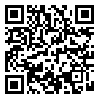Wed, Feb 4, 2026
[Archive]
Volume 8, Issue 17 (2015)
J Med Edu Dev 2015, 8(17): 58-69 |
Back to browse issues page
Download citation:
BibTeX | RIS | EndNote | Medlars | ProCite | Reference Manager | RefWorks
Send citation to:



BibTeX | RIS | EndNote | Medlars | ProCite | Reference Manager | RefWorks
Send citation to:
Madarshahian F, Hassanabadi M, Khazaei S. Effect of research methodology teaching based on evidence based care, applications and research designing on knowledge, attitude and teaching satisfaction. J Med Edu Dev 2015; 8 (17) :58-69
URL: http://edujournal.zums.ac.ir/article-1-347-en.html
URL: http://edujournal.zums.ac.ir/article-1-347-en.html
1- Birjand University of Medical Sciences , f_madarshahian@yahoo.com
2- Birjand University of Medical Sciences
3- Ministry of Health
2- Birjand University of Medical Sciences
3- Ministry of Health
Abstract: (24687 Views)
Background and Objective: Traditional teaching of research methodology is associated with low learning and satisfaction but effective teaching increase professional abilities and positive attitude toward science. In this study the effect of research methodology teaching based on evidence based care, applications and research designing, on knowledge, attitude and teaching satisfaction was studied.
Materials and Methods: In this quasi experimental study fifth semester nursing students at Birjand University of medical sciences were selected through census method in 2012 and for research methodology teaching from text books, at random were divided into two groups of 39 experimental and control students. Intervention included promoting skills to providing “evidence based care”, education of research methodology applications in different courses and cares and group designing of 11 research plans. In the control group, teaching was conducted using group discussion. Two researcher-developed questionnaires at the beginning and end of the study were used. Intervention outcomes included scores of research knowledge, attitude toward benefits, necessity and research methodology applications and teaching satisfaction that were measured by 20 multiple choice questions, 12 and 21 likert scale items (score1-5) respectively. Data were analyzed by Chi-square, independent and paired t-tests, using SPSS 16 software.
Results: After intervention, the total research knowledge score of the experimental group (6.05±8.59) was higher than control (2.74±5.51) group (P<0.041). The attitude score of experimental group toward research after intervention to compare control group (P<0.028) and to with before intervention was higher (P<0.015). The teaching satisfaction score of experimental group (78.61±8.67) was higher than the control (71.23±9.24) group (P<0.001).
Conclusion: Research methodology teaching combined with ongoing support for students, based on evidence based care, applications and group designing of research, can establish a relationship between the principles, designing, implementation and applications of research, increase knowledge and facilitate attitude and satisfaction.
Article Type : Orginal Research |
Subject:
Education
Received: 2014/06/23 | Accepted: 2014/12/29 | Published: 2015/03/17
Received: 2014/06/23 | Accepted: 2014/12/29 | Published: 2015/03/17
Send email to the article author
| Rights and permissions | |
 |
This work is licensed under a Creative Commons Attribution-NonCommercial 4.0 International License. |



